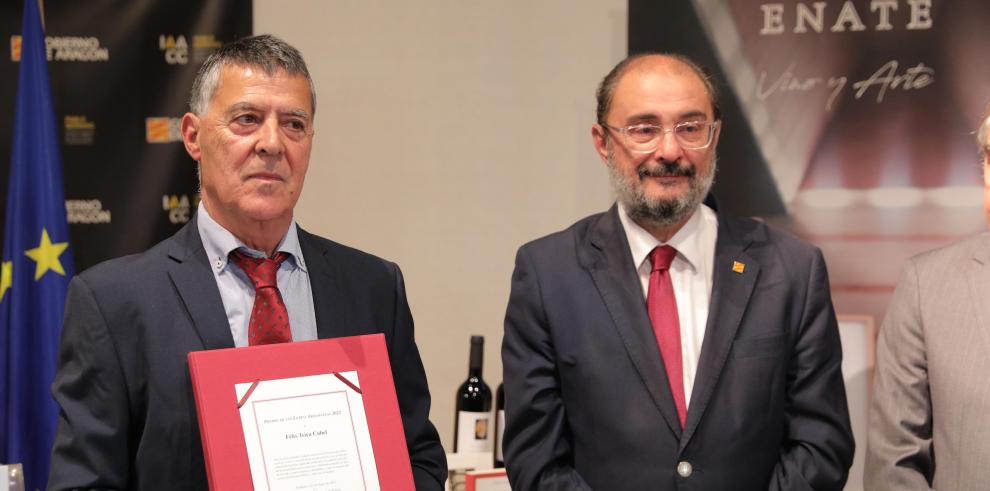Félix Teira Cubel (Belchite, 1954), writer and professor, has just been recognized with one of the most prestigious literary awards in Aragon. The jury has awarded him the Premio de las Letras Aragonesas “for his great quality and solid literary career, which combines critical spirit and social sensitivity thanks to its profound human dimension, knowing how to confront the moral dilemmas of the present with creation, and having won over the years both the appreciation of the public and the respect of the professional book and publishing sector in Aragon”.
Congratulations for the Premio de las Letras Aragonesas, how are you living this moment?
Awards are always received with gratitude, they comfort you but at a certain age you live them with a certain skepticism. I am grateful, I am going to enter the honor roll of people I admire, Martínez de Pisón, José María Conget, Ana Alcolea... Being in the same honor roll makes me proud, but everything with a certain calmness. There are certain ages in which everything is lived more calmly.
This has been the latest recognition but recently you have also received the Imán award at the annual gala of the Aragonese Writers Association and the Arts and Letters Award of Heraldo de Aragón, in the category of Literature.
This year it’s a very good year. The Imán is nice because it is voted by writer friends. Then the Heraldo Award, which came to me from Artes y Letras, and now this one… it’s a sweet time.
Do these awards, which highlight an entire career, invite you to take stock and reflect on your career?
One of the things they say is that they publish an anthology so I have been reading myself to get a couple of pages of each of my works. This is going to be petulant but I was marked by the Lazarillo and I wanted to be like the author that nobody knows who he is and be a witness of my time and tell the truth. I have been telling what was happening in my society.
I remember that the war in Yugoslavia affected me a lot. Suddenly, because of nationalism and religious issues, people were killing each other. As a result of that I wrote ‘The Violence of the Violets’. Then, at a time when Le Pen began to win in many parts of France, I wrote ‘The Free City‘, thinking about where we are heading if they [the extreme right-wing parties] win.
I dealt with the 2008 crisis in several novels, ‘laciega.com‘, which I am very fond of, and ‘Con hijos y padres‘ (With children and parents). I took 17-year-old kids whom I knew well and who, with all the acrimony and savagery they have at the age of 17, told what the crisis was like. I have been in some way a witness of my time.

Do you think literature has to have a certain commitment to reality?
Mine doesn’t stand up if it doesn’t. If it doesn’t, it doesn’t stand up. What has helped me and moved me is the literature that has tried to tell me what my society is like, even ideologically. It has been shaping me even ideologically and I owe a lot to literature and in that line I try to imitate and make my writings.
You have said on several occasions that writing was like a virus without a cure.
Yes, I also see it with my colleagues. I talk to people who write and we have the same or similar illusion that we had when we were 30 or 40.
Your facet as a writer has been nourished by your work as a teacher. Has teaching and contact with young people helped you to know what they were looking for in literature?
Absolutely. I wrote three juvenile novels, which are falsely juvenile, because the last two are loved by adults and I love that adults love them. I was with them, I heard them, teenagers appreciate that you deal with topics even if they are thorny.
I was very afraid to write for young people but given the insistence of an editor of Anaya I tried with ‘Saxo y rosas’ which is the worst novel and the one that has given me more money. Worst in the sense that I took a classic theme: rich girl, poor boy. It was also about hatred of immigrants and the appearance of the first fascist signs. Then I saw that it made money and that the kids were having a good time. I started to write whatever I wanted; I didn’t make as much money and there weren’t as many editions in the following ones, but I wrote because I wanted to.
In the second one, ‘¿Y a ti todavía te te cuentan cuentos…?‘(‘And they still tell you stories…?) , the boy is suddenly told that his mother is a prostitute. The boy wants to make amends to his mother so that she becomes rich and in the end he has his moral. I remember that this book was not banned, but it was vetoed in two or three schools by the parents’ association, which I thought was very good. A parent, in confidence, told me and I said: “I think your criteria is very appropriate but keep in mind one thing, when you are 500 meters away and the teachers are 1000 meters away, these kids are going to talk about politics, sex, they are going to make teachers and parents green and if they don’t talk about it, bad”.
I felt very good writing these juvenile books and seeing the response. They are the only ones I made money on. They still sold more than 50,000 of ‘Sax and Roses’, then they put them in readers’ circles. I went to many high schools and I saw that there were kids whose eyes were shining, they had been touched.
In the third book, ‘Una luz en el atardecer‘ (A light in the sunset), I deal with another thorny subject: how to talk about death, how do I tell my 16-year-old son that his grandfather has committed suicide. I dealt with that subject and there are also loves, illusions. It comforts me to know that the kids got it. From ‘Sax and Roses’ I still have a thousand letters from girls who wrote: “I also go out with a guy my mother doesn’t like”. It was useful for me to be with the young people above all to hear them, to be credible you have to speak in their jargon, otherwise it sounds fake to them.
Teaching has given me freedom. If everything had been like ‘Sax and Roses’, I would have considered leaving teaching to devote myself to writing, I don’t know if it would have been a good decision. It has given me freedom because my food was assured and my mortgage payments were assured. That was wonderful to write about whatever I wanted. I remember the editor of Anaya who was always teledirecting me: “Don’t write anything with explicit sex, we sell in many religious schools”. In ‘Una luz en el atardecer’ it is a hymn to sensuality that is not explicit but is the most wonderful.
The beautiful thing about this profession is that you have been able to write twelve novels and I don’t know how to write the next one.
It is often said that young people don’t read, but is that true in your experience?
There was a time when adult writers switched to juvenile because it was like a fish farm, it was very easy to catch fish. Young people stop reading at 16 or 17 but, until then, they all read and read a lot. I believe that whoever disconnects does not come back. The work is either done in high schools or it is bad. Even in college they don’t come back. The hobbies that get you hooked for life have to be fixed at 18 and if not, bad.
What do you think young people are looking for in literature?
I think we are all looking for the same thing. Life comes without instructions, in fact, there is a book by a certain Georges Perec called ‘Life Instructions for Use’. When life comes without instructions, it makes you look for them, just as I did as a teenager and still do: why there is death, sickness, why so many things. Then the kids also look for how to face problems that they see as very difficult to see how others have solved them, even if it is in books. It is about unraveling this wonderful mystery of living.
On the day of your retirement, if I’m not mistaken, your classmates at IES Pablo Serrano in Zaragoza surprised you because they had named the school library after you. What was that moment like?
Everyone was paying attention and I didn’t know about it. I have no difficulty speaking in public and that day I couldn’t get out of it. I was proud, but I didn’t know how to react or how to express my gratitude.
In an interview you commented that youth is rewarded and that older writers are not given so many opportunities. Is youth overvalued?
I love the fact that it is overrated. Madrid has signed Camavinga because he is 19 years old, not because he is 40. If a publishing house receives a good manuscript from a young person or one of mine, it will prefer that person because there is more experience, because if he breaks like that now, how will he break later. And we have to accept that this is the way it is.
I could give you a score of examples of young people I have read, which I also like to keep an eye on: ‘Llego con tres heridas’, ‘El último hombre blanco’… The publishers want new values but we old ones defend ourselves.
Mario Muchnik was your first publisher, what memories do you have of him?
He was a very important pillar. He introduced me to all the people who were in the publishing world and whom I had idolized. At one point I rubbed shoulders with all the cream of the crop.

The guy was very straightforward and also gave me a lot of advice that I didn’t follow, and that’s how it went. He had a flaw, that’s how it went: he cared more about literature than money and it has to be half and half. He had a hard time because he had always cared more about literature than money.
The war in Yugoslavia affected you a lot, how do you experience the war in Ukraine now?
All very negative. I have been writing an essay on Goya for two years. The guy is very interesting, the second half of his life is very interesting, with Jovellanos, he is one of the great enlightened and the War of Independence moved him. Goya hoped that the French would remove the Inquisition, that they would modernize… But he also saw that those of Liberty, Equality and Fraternity were massacring his people and I think he painted the best anti-war testimony, the ‘Disasters of War‘. They have a value because they are not patriotic. There are many scenes of Frenchmen killing Spaniards in the most cruel way, but there are also many scenes of Spaniards killing Frenchmen. Goya hated such violence.
Well, in Bucha (Ukraine) Goya’s disasters have been repeated as they are. In the prologue of ‘The Violence of Violets’ I say that in the species of this evolved monkey there is a murderous passion and there is also an angelic part, but the murderous part still appears. That everything that Goya drew in Bucha is repeated after 200 years is sad because we have not progressed at all, we are still the same.
On the other hand, in your latest novel, ‘Cold Fire’, you deal with ambition.
I enjoyed it. The short format has its charm, like ‘The foreigner’, ‘Death in Venice’, ‘Pedro Páramo’. You give the reader something that can be read in an hour and if you like it, fine, and if you don’t, don’t curse the writer either. I had a great time because when there is the possibility of a great fortune, in this case on the condition that your father dies, it rots the characters. Ambition corrupts. You have a good time trying to analyze yourself, how you would act in that situation.

What can you tell us about your next novel, which will deal with millennials?
There is a fact, in laciega.com I put a phrase from Martin Amis: “The world belongs to the people who are 35 today”. They set the guidelines that everyone else will follow. The backbone is those people. Those people in our Spain today, not all of them, of course, but there is a part that cannot find a place, they are on scholarships, they are in precarious jobs, housing is inaccessible… I find it regrettable.
The baby boom generation, to which I belong, almost all of us have an apartment, we have all had a car, we had to finish studying and work, and now we do not. We receive good pensions.
It is a generation that has also lived through several crises. Do you think society owes them something?
Of course it does. My pension depends on all of us, on you doing well so that you continue to contribute and I continue to receive my pension. Either we make room for these younger generations or it’s bad.
Is there a certain disenchantment with the idea of education as a social elevator?
As a teacher, I owed this novel. You can’t write a thesis novel because that’s what you write an essay for. There have to be characters that give it strength and keep it on its feet, each one with his or her own problems. As a teacher, I owed it to them, because I encouraged them to study and work because that was the future and the social elevator mechanism of education has been broken, of course.
It sounds hopeless.
But if that is the case, it must be said so that it can be remedied. In my time, the social elevator worked. You finished studying and the next day you worked. When all those people started earning money, they aspired not to blue overalls but to have our children wear white coats. They encouraged their children to go to university but there was a limit to that. Qualified technicians were needed, but also vocational training, which is the average technician who pulls the chestnuts out of the fire. This has always been a little bit discredited and neglected. In VET there is a whole field to be done, we have not addressed it, we have to address it well.
What do you like to read? What do you ask of reading?
I ask for everything and then, when I ask for everything, many of them disappoint me. I ordered the library in town and I don’t know how many novels there are, but maybe I’ll keep 200 and the rest are worthless. I mean, you buy a novel and now that I’m retired every week I read one or two and I ask them for everything, many of them disappoint me. You ask for the great utopia that I propose to myself when I write and that I will never achieve, which is to bring about even the slightest change in the reader. That is to say, the one who has started my novel or whatever it is and the one who finishes it is not the same because you have expanded his world, you have given him new tools and you have transformed him in some way. That is a utopia that is always being pursued.
Would you recommend an Aragonese author?
I think Ramón J. Sender is impressive. He wrote Nancy’s t’ because he had to eat, which they didn’t understand, but he went into exile with his clothes on his back and they had killed his wife and also a brother-in-law.
But he wrote two great novels, one before the war, ‘Imán’, an anti-war testimony of the first magnitude and I think that he has not been given all the space that the novel has. On top of that, it talks about the Africanists who would later be the ones to carry out the coup d’état in the civil war. Those people who had no money to avoid the military service and who went to Africa.
The other is ‘Requiem for a Spanish peasant’, when the colt of Paco the miller enters the church, the first time I read it I felt a shiver. What strength, what a capacity for concentration and he allows himself to make a romance to link with the romancero nuestro. A work of art, tiny, but a work of art.














